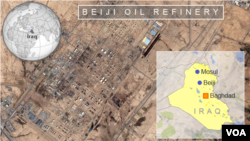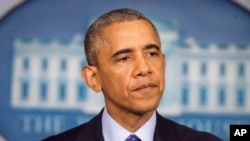The ongoing conflict in Iraq has displaced more than one million people so far this year, the United Nations reports, connecting the massive disruptions to domestic divisions and a spillover of violence from Syria.
Iraq’s internal sectarian divisions and several years of war in neighboring Syria have fueled the region’s instability, the U.N. Refugee Agency said in a report released Friday.
Much of the displacement has occurred in western Anbar province. This month’s breathtakingly swift, bloody advance of fighters from the Islamic State of Iraq and the Levant Islamic, who’ve seized control of several key Iraqi cities, has upended more lives, with at least 500,000 fleeing the city of Mosul alone.
Syria tied to Iraqi upheaval
U.N. Secretary-General Ban Ki-moon, in a speech Friday to the Asia Society, linked the displacement in Iraq to a spillover of violence from Syria.
"Divisions within Syria, the region and international community, even within the United Nations, and continued arms flows continue to fuel the conflict," Ban said. "These bleak prospects have darkened further with a flare of violence and sectarian tensions in Iraq. Suddenly the cohesion and integrity of two major countries, not just one, is in question."
"The time is long past for the international community, in particular the Security Council, to uphold its responsibilities," he said in urging the U.N. council to impose an arms embargo on Syria.
Ban also discouraged airstrikes against ISIL, the al-Qaida splinter group also known as the Islamic State of Iraq and Syria.
Military strikes, he cautioned, "might have little lasting effect or even be counter-productive if there is no movement toward inclusive government in Iraq."
Battle over refinery continues
Iraqi troops continued battling Islamic militants over control of a major oil refinery Friday, amid news that the insurgents have seized a chemical weapons facility once owned by the late Saddam Hussein.
Since Tuesday, there has been intense fighting for control of the sprawling Beiji refinery, located about 250 kilometers (155 miles) north of Baghdad. As of Friday, each side held a portion of the facility.
Fighters with the Islamic State in Iraq and the Levant (ISIL) have wrested control of the chemical weapons facility, the U.S. State Department said Thursday.
Spokeswoman Jen Psaki said the U.S. "remains concerned about the seizure of any site by the ISIL," but said the complex likely does not contain chemical weapons of military value. She stressed it would be "very difficult, if not impossible, to safely move the materials."
Cleric's call to arms clarified
Meanwhile, Iraq’s top Shiite cleric urged all Iraqis to unite against the ISIL-led Sunni jihadists overtaking swaths of the country, including most of one province and parts of three others.
Grand Ayatollah Ali al-Sistani said if the insurgents are not “fought and expelled from Iraq, everyone will regret it tomorrow, when regret has no meaning," his spokesman said Friday in the shrine city of Karbala, according to the French news agency AFP.
In televised remarks, spokesman Abdul Mehdi al-Karbalai said the ayatollah’s call last week for Iraqis to join the armed forces was meant to transcend sectarian and ethnic divisions and “was for all citizens, without specifying a religion.”
"The goal was to get ready to face the takfiri group called ISIL, which now has the upper hand... in what is happening in many provinces," al-Karbalai said, using an Arabic word roughly translated as extremist, AFP reported.
The ayatollah’s call for volunteers bolstered the ranks of the struggling Iraqi army as it battles the Sunni militants -- including some fighters loyal to Hussein.
Sistani calls for new, 'effective' government
In a hit to the country's Shi'ite prime minister, Nouri al-Maliki, Sistani called on Friday for a new, "effective" government that avoids "past mistakes" amid a widening offensive by Sunni militants.
The remarks come after U.S. President Barack Obama called on Maliki to create an agenda "inclusive" of Iraq's Sunni and Kurdish minorities or risk civil war.
U.S. officials would not comment directly Friday on Sistani's statement. But White House Spokesman Josh Earnest said a successful Iraqi government would be one that governs in an "inclusive fashion." State Department Spokeswoman Jen Psaki said one of the administration's primary messages to Iraqi leaders is that "now is a time to be unified" against the shared threat they face.
US to send 300 advisers
Obama said Thursday he is prepared to send more equipment and up to 300 U.S. advisers to help Iraq fight against the militants that have already taken over much of the country's northern region.
Speaking from the White House, Obama ruled out sending U.S. ground forces back into Iraq after withdrawing combat troops in 2011 following eight years of fighting. But he said is ready to take what he calls "targeted" military action as necessary, leaving the door open for possible airstrikes against Sunni militants.
Story continues below
Kerry heads to Middle East
Obama is sending Secretary of State John Kerry to the Middle East and Europe this weekend for talks with U.S. allies.
Kerry called ISIL a threat to everyone in the region, saying there's no single military answer to the Iraqi crisis. He said forming a new unity government as rapidly as possible will be the greatest single step toward quelling the violence and finding a solution.
Iraq’s internal sectarian divisions and several years of war in neighboring Syria have fueled the region’s instability, the U.N. Refugee Agency said in a report released Friday.
Much of the displacement has occurred in western Anbar province. This month’s breathtakingly swift, bloody advance of fighters from the Islamic State of Iraq and the Levant Islamic, who’ve seized control of several key Iraqi cities, has upended more lives, with at least 500,000 fleeing the city of Mosul alone.
Syria tied to Iraqi upheaval
U.N. Secretary-General Ban Ki-moon, in a speech Friday to the Asia Society, linked the displacement in Iraq to a spillover of violence from Syria.
"Divisions within Syria, the region and international community, even within the United Nations, and continued arms flows continue to fuel the conflict," Ban said. "These bleak prospects have darkened further with a flare of violence and sectarian tensions in Iraq. Suddenly the cohesion and integrity of two major countries, not just one, is in question."
"The time is long past for the international community, in particular the Security Council, to uphold its responsibilities," he said in urging the U.N. council to impose an arms embargo on Syria.
Ban also discouraged airstrikes against ISIL, the al-Qaida splinter group also known as the Islamic State of Iraq and Syria.
Military strikes, he cautioned, "might have little lasting effect or even be counter-productive if there is no movement toward inclusive government in Iraq."
Battle over refinery continues
Iraqi troops continued battling Islamic militants over control of a major oil refinery Friday, amid news that the insurgents have seized a chemical weapons facility once owned by the late Saddam Hussein.
Since Tuesday, there has been intense fighting for control of the sprawling Beiji refinery, located about 250 kilometers (155 miles) north of Baghdad. As of Friday, each side held a portion of the facility.
Fighters with the Islamic State in Iraq and the Levant (ISIL) have wrested control of the chemical weapons facility, the U.S. State Department said Thursday.
Spokeswoman Jen Psaki said the U.S. "remains concerned about the seizure of any site by the ISIL," but said the complex likely does not contain chemical weapons of military value. She stressed it would be "very difficult, if not impossible, to safely move the materials."
Cleric's call to arms clarified
Meanwhile, Iraq’s top Shiite cleric urged all Iraqis to unite against the ISIL-led Sunni jihadists overtaking swaths of the country, including most of one province and parts of three others.
Grand Ayatollah Ali al-Sistani said if the insurgents are not “fought and expelled from Iraq, everyone will regret it tomorrow, when regret has no meaning," his spokesman said Friday in the shrine city of Karbala, according to the French news agency AFP.
In televised remarks, spokesman Abdul Mehdi al-Karbalai said the ayatollah’s call last week for Iraqis to join the armed forces was meant to transcend sectarian and ethnic divisions and “was for all citizens, without specifying a religion.”
"The goal was to get ready to face the takfiri group called ISIL, which now has the upper hand... in what is happening in many provinces," al-Karbalai said, using an Arabic word roughly translated as extremist, AFP reported.
The ayatollah’s call for volunteers bolstered the ranks of the struggling Iraqi army as it battles the Sunni militants -- including some fighters loyal to Hussein.
Sistani calls for new, 'effective' government
In a hit to the country's Shi'ite prime minister, Nouri al-Maliki, Sistani called on Friday for a new, "effective" government that avoids "past mistakes" amid a widening offensive by Sunni militants.
The remarks come after U.S. President Barack Obama called on Maliki to create an agenda "inclusive" of Iraq's Sunni and Kurdish minorities or risk civil war.
U.S. officials would not comment directly Friday on Sistani's statement. But White House Spokesman Josh Earnest said a successful Iraqi government would be one that governs in an "inclusive fashion." State Department Spokeswoman Jen Psaki said one of the administration's primary messages to Iraqi leaders is that "now is a time to be unified" against the shared threat they face.
US to send 300 advisers
Obama said Thursday he is prepared to send more equipment and up to 300 U.S. advisers to help Iraq fight against the militants that have already taken over much of the country's northern region.
Speaking from the White House, Obama ruled out sending U.S. ground forces back into Iraq after withdrawing combat troops in 2011 following eight years of fighting. But he said is ready to take what he calls "targeted" military action as necessary, leaving the door open for possible airstrikes against Sunni militants.
Story continues below
Kerry heads to Middle East
Obama is sending Secretary of State John Kerry to the Middle East and Europe this weekend for talks with U.S. allies.
Kerry called ISIL a threat to everyone in the region, saying there's no single military answer to the Iraqi crisis. He said forming a new unity government as rapidly as possible will be the greatest single step toward quelling the violence and finding a solution.









